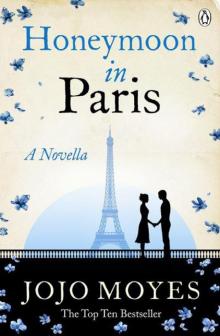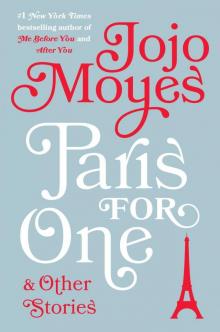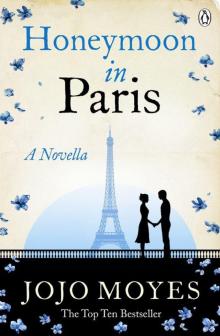- Home
- Jojo Moyes
Windfallen Page 8
Windfallen Read online
Page 8
"Then have some melon, dear," said Mrs. Holden. "It's got a lovely mild flavor. You know, Guy's father imports fruit from all sorts of amazing places. Honduras, Guatemala, Jerusalem. Last night he told us about fruits that we've never even heard of. Did you know there is actually a fruit shaped like a star?" She had gone quite pink with pride.
Mrs. Ansty swallowed and winced with pleasure. "Ooh, that melon is lovely."
"You must take a bit home for your Arthur. Guy has told us he'll get his father to send us some more from London. He's got ever such a big company. And Guy is the only child, so he'll have a very nice business to go into one day. More pineapple, Sarah? There are some napkins here, ladies, if you need them."
Mrs. Chilton smiled primly and refused a second piece. They were all pleased that Susan had got Celia safely betrothed. But it didn't do to get too full of oneself. "You must be so relieved," she said carefully.
Susan Holden looked up sharply.
"Well . . . girls can be such a worry, can't they? We're all very glad you've got your Celia taken care of. And we'll be keeping our fingers crossed for little Lottie. Although she's never been quite as much of a worry to you, has she, dear?" She paused, accepting a proffered Nice biscuit from Virginia, who had just entered with a tea tray.
Mrs. Holden's smile had gone all wobbly again.
Mrs. Chilton settled back in her chair and gave Mrs. Holden an encouraging one of her own. "Now, ladies, what are we going to do about Arcadia House? I've been thinking . . . perhaps someone should have a quiet word. Someone with some weight, like Alderman Elliott. But I think they should be told, those bohemians, or whatever they think they are. I don't think they realize quite how we do things in Merham."
LOTTIE LAY ON HER BED PRETENDING TO READ, TRYING not to listen to the sounds of laughter outside, where Celia and Guy were playing tennis on the lawn, apparently oblivious to the blustering wind and Frederick's overzealous ball boying.
She stared accusingly at the page in front of her, aware that she had been gazing at the same paragraph for nearly forty minutes. If anyone had asked her what it was about, she wouldn't have been able to answer. Then, if anyone had asked her what anything was about, she wouldn't have been able to answer. Because nothing made sense. The universe had exploded, fragmented, and all the bits had landed back in the wrong place. Except only Lottie had noticed.
She heard Celia shriek accusingly, the cry dissolving into loud giggles, and underneath it Guy's voice, more measured, instructing her in something. His voice held a bubble of laughter, too, but he hadn't let his out.
Lottie closed her eyes and tried to breathe. Anytime now she knew that Celia would send someone upstairs to see if she would come and join them. Perhaps make up a comedy four, if Frederick demanded to be allowed to play. How could she explain her sudden aversion to tennis? How could she explain her sudden reluctance to go outside? How long before someone realized that wasn't Lottie being "unsociable," as Celia had laughingly accused her? Before they realized it wasn't just another of her foibles, this sudden reluctance to spend time with her best friend?
She stared at the new blouse hanging on the door handle. Mrs. Holden had given her one of her "looks" when she'd thanked Celia for it. Lottie knew she thought her graceless. She should have been more grateful. It was a very nice blouse.
But Lottie hadn't managed to say much at all. Because there was nothing Lottie was going to be able to say. How could she? How could she explain that the first moment she had set eyes on Guy everything she knew, everything she believed, had been sucked away from her like someone pulling a rug from under her? How could she explain the searing pain of familiarity at his face, the sudden, bitter joy of recognition, the deeply held certainty that her very bones were already familiar with this man; they had to be--weren't they cast from the same human porcelain as his? How could she tell Celia she couldn't possibly marry this man she had brought home as her fiance?
Because he belonged to her?
"Lottie! Lots!" The voice drifted upward, carried on the air. Just as she had known it would.
She waited until the second summons, then opened the window. Looked down. Tried to keep her gaze on Celia's upturned face.
"Don't be boring, Lots! You're not studying for exams now."
"I've got a bit of a headache. I'll be down later," she said. Even her voice sounded different.
"She's been in there all day," said Frederick, who was throwing tennis balls against the side of the house.
"Oh, come on, do. We're going to head over to Bardness Point. You could fetch Joe. Make a four. Come on, Lots. I've hardly seen you."
She wondered that Celia couldn't tell that her smile was false. It hurt the sides of her mouth.
"You go on. I'll just wait for this headache to clear up. We'll do something tomorrow."
"Boring, boring, boring. And I've been telling Guy what a bad influence on me you are. You'll think I'm fibbing, won't you, darling?"
"Tomorrow. Promise."
Lottie pulled her head back into the bedroom so that she wouldn't have to see their embrace.
She lay facedown on her bed. And tried to remember how to breathe.
GUY PARNELL OLIVIER BANCROFT HAD BEEN BORN IN Winchester, making him technically English. But that was the only English thing about him. Everything--from his tanned skin, so at odds with most of the pale English complexions around him, to his relaxed, diffident manner--marked him out as separate from the young men the girls had known. Merham men anyway.
He was a self-contained young man, polite, reserved, who nonetheless carried the casually gilded air of the heir apparent, surprised by little and prepared at all times for good things to happen. He seemed to suffer none of the tortured self-examination of Joe or be driven by the testosterone-fueled bullishness of the other boys. He gazed a bit wide-eyed around him, as if permanently amused at some unforeseen joke, occasionally letting out bursts of uninhibited and joyful laughter. (He was the kind of young man you couldn't help smiling at, Mrs. Holden confided to her husband. But then Guy made her smile a lot; once she had got over the shock of her daughter's swift engagement, she had viewed him as indulgently as a firstborn son.) Guy seemed as equally unfazed by the man at the taxi rank as by the prospect of formally asking Dr. Holden for his daughter's hand in marriage. (He hadn't yet. But then he had been there only a couple of days, and Dr. Holden had been terribly busy.) If he was somewhat passive, somewhat less forthcoming than the Holdens would have liked, then they weren't going to judge him for it (gift horses and all that).
But none of this should have been a surprise. For Guy Bancroft had spent most of his life freed from the rigid social conventions of boys' public schools or suburban social circles. An only child, he had grown up as the veritable apple (his joke) of his father's eye and, after a short, unsuccessful spell at British boarding school, was regathered to the family bosom and carted, along with their luggage, from tropic to subtropic, as Guy Bertrand Bancroft (Senior), astutely recognizing the appetite of deprived Britons for nonindigenous fruit, swiftly built up his import business, finding channels to satisfy their increasing passion.
Guy had subsequently spent his childhood wandering the huge fruit estates of the Caribbean where his father had initially based himself, exploring the deserted beaches, making friends with the black workers' children, educated sporadically by tutors when his father remembered to hire them. Guy didn't need formal education, the father would exclaim (he was very fond of exclaiming. It may explain why Guy the younger was rather quiet). What good did 1066 and all that ever do him? Who cared how many wives Henry VIII had? (the king could hardly have kept track himself). Everything he'd learned was in the School of Hard Knocks. Graduated (the boy's mother used to raise her eyebrows comically at this point) from the University of Life. No, the boy would learn far more left free to roam wild. More about geography--compare and contrast the stepped crop fields of central China with the vast, open agricultural acres of Honduras--more about politics, more about r
eal people and their cultures and beliefs. Math he could learn from the accounts. Biology--why, look at the insect life!
But they all knew the real reason. Guy Senior just liked having him around. Late and much longed for, the boy was all he'd ever wanted. He didn't understand those parents who wanted to pack their offspring off to stuffy old private schools where they would learn stiff upper lips and snobbishness and likely be bugger--"Yes, darling," his wife would interrupt firmly at this point. "I think you've made your point."
Guy told them this over a succession of family meals. He left out the bit about buggery, but Celia had told Lottie that when they lay in bed, talking in the darkness. Well, Celia talked. Lottie had pretended unsuccessfully to be asleep, believing that her only hope of sanity lay in being unable to flesh out the vision of Guy into any kind of human reality.
They were not the only ones talking about Guy. Mrs. Holden had been quite disconcerted by his casual mention of his black friends, and she'd asked Dr. Holden repeatedly afterward whether he thought "that was all right."
"What are you worried about, woman?" said Dr. Holden irritably. "That it'll rub off?" Things were different out there, he said eventually, when Mrs. Holden's face had stayed pinched and hurt beyond even its usual time frame for such things. The boy probably didn't have many opportunities to meet his own. And besides, Susan, times were changing. Look at the immigration. (He had rather wanted to read his newspaper in peace.)
"Well, I just wonder if it betrays a little . . . laxity on behalf of his parents. How's a child supposed to grow up knowing what's what if they're only mixing with . . . staff?"
"So remind me to fire Virginia."
"What?"
"Well, we can't have Freddie and Sylvia talking to the girl, can we?"
"Henry, you're being deliberately obtuse. I'm sure Guy's family are perfectly fine. I just think . . . his upbringing sounds . . . a little unusual, that's all."
"Susan, he's a fine young man. He has no tics, no obvious deformities, his father is extremely wealthy, and he wants to take our troublesome young flibbertigibbet off our hands. As far as I'm concerned, he could have been brought up playing the bongo drums and eating human heads."
Mrs. Holden hadn't known whether to laugh or be appalled. It was so hard to gauge Henry's sense of humor sometimes.
Lottie was unaware of any of this. At mealtimes she had spent most of the time focused intently on her soup or praying that no one would bring her into conversation. Not that she really had to worry. Mrs. Holden was too busy quizzing Guy about his family and what his mother thought of life back in Britain, while Dr. Holden asked the odd question about whether his father was likely to be affected by all that trouble over land reforms in Guatemala and whether the cold war was really going to make a difference to overseas traders.
For it was too difficult to be near him. It was too hard to listen to his voice (when had she heard it before? She must have heard it before. Its timbre was etched on her very soul). His proximity sent her thoughts scrambling, to the point where she was sure she would betray herself. The scent of him, that barely detectable sweetness, as if he still carried the tropics on his very person, left her stumbling over once familiar words. So it was safer not to look at him. Safer not to see his beautiful face. Safer not to have to watch Celia drape her hand possessively over his shoulder or absentmindedly stroke his hair. Safer to stay away. Safer to stay away.
"Lottie? Lottie? I've asked you three times whether you want runner beans. Do you need your ears syringed?"
"No, thank you," whispered Lottie as she tried to stop her heart from jumping out of her chest.
He had looked at her once. Only once, when she had been frozen, standing on the platform, almost felled with shock at her own reaction to him. His eyes, when they had met hers, had bored into her like twin bullets.
"IT'S A D."
"No, no, you're looking at it from the wrong angle. It could look like a G."
"Oh, Mummy. Really. You can't cheat like that."
"No, honestly, darling. Look. It really is a G. Isn't that lovely?"
Lottie had walked into the kitchen to fetch a glass of milk. She hadn't eaten properly for several days and, feeling nauseous, had hoped the milk might settle her stomach.
She hadn't expected to find Celia and her mother peering over their shoulders onto the flagstoned kitchen floor. Susan Holden had an uncharacteristic air of merriment about her. At the sound of Lottie's footfall, she looked up and gave her a rare, uninhibited smile.
"I--I just came for some milk."
"Look, Lottie. Come here. This is very like a G from this particular angle, don't you think?"
"Oh, Mummy." Celia was laughing hard now. Her hair had separated into golden ribbons, one of which was slightly caught on her cheek.
Lottie peered over onto the kitchen floor. There lay a piece of apple peel, carved carefully in one elongated spiral, sprawled in an uneven curve.
"It's definitely a G."
"I don't understand," said Lottie, frowning. Mrs. Holden scolded Virginia if she left any bits of food on the floor. It would apparently encourage pests.
"G for Guy. I've never seen a clearer one," said Mrs. Holden determinedly before stooping and picking it up. She winced slightly as she did this; she was still buying her girdles too small.
"I'm going to tell Guy it was a D. He'll be fearfully jealous. Who do we know who's a D, Lots?"
She hardly ever saw Celia and her mother laughing together. Celia had used to say her mother was the most irritating woman on earth. It made her feel as if Celia had joined some new club, as if they had both moved on and left her behind.
"I'll get my milk."
"Elvis the Pelvis," said Frederick, who had walked in holding the dissected innards of an old wristwatch.
"I said D, you little idiot." But Celia said it fondly. No wonder she's being nice to everyone, thought Lottie. I'd be nice to everyone.
"Do you know, Mummy, Guy says my lips are like petals."
"Bicycle pedals," said Frederick, screaming with laughter. "Ow!"
"D for Dreamboat. D for Dreamy. He is a little dreamy, isn't he, Mummy? I wonder where he's gone sometimes. Shall we do one for you, Lottie? It might come out as a J . . . you never know."
"I DON'T KNOW WHAT'S GOT INTO THAT GIRL," SAID Mrs. Holden at Lottie's bristling, departing back.
"Oh, Lottie's Lottie. She'll be all right. She's just got a mood on about something." Celia smoothed her hair back and checked her reflection in the mirror over the fireplace. "Tell you what, do me another one. With that green apple there. We'll use a sharper knife this time."
LOTTIE WAS OFFERED A JOB IN THE SHOE SHOP. Shelford's Shoes, at the far end of the Promenade. She took it, not because she had to (Dr. Holden said she was welcome to wait a while and decide what it was she wanted to do) but because being out at the shoe shop three days a week was so much easier than being at the Holdens'. And it was almost impossible to get to Arcadia. There were spies all over the village, just waiting to warn off anyone who ventured up toward the House of Sin.
Guy had left for almost a week, and for that short period she had been able to breathe again, had just about managed to appear normal. (Luckily Celia was so locked in to her little bubble of love that she hadn't really questioned what Mrs. Holden was now referring to as Lottie's "episodes.") But then he had returned and said his father had told him to "have some fun, a little holiday" before starting his fledgling career in the family business. And Lottie, who had now become physically bowed by the weight of longing she carried around with her, had braced herself for yet more of the same.
Worse, he was now living with them. He had been about to search for lodgings, had asked the Holdens whether there was anywhere particular they would recommend--that Mrs. Chilton's place, for example. But Mrs. Holden wouldn't hear of it. She had made him up a room at Woodbridge Avenue. At the far end of the house, you understand. With a water closet of his own. So there would be no need for any walking around
the house in the middle of the night, would there? ("Very sage, dear," Mrs. Chilton had said. "There's no accounting for hormones.") But there had been no question of not having him stay. Mr. Bancroft Senior would see that they were a welcoming family. With a large house. The kind of family one would positively aspire to marry into. And the huge crate of exotic fruit he sent up every week in lieu of housekeeping money didn't go amiss, admittedly. No point Sarah Chilton's being on the receiving end of that.
And three days a week Lottie would walk resignedly down the hill and across the municipal park, bracing herself for a day of squeezing size-eight feet into size-seven Mary Janes and wondering how long she was going to be able to live with this degree of pain and longing.
Joe didn't come.
It had taken her almost ten days to notice.
THEY DECIDED ON A LETTER. AN INVITATION. THERE were ways of getting people to do what you wanted without confrontation, Mrs. Holden said. And Mrs. Holden was very keen on avoiding confrontation. The ladies of the salon wrote a polite letter to Mrs. Julian Armand, asking if she would care to join them, partake of a few refreshments, and see a little of local society. It would be their pleasure, they said, to welcome a fellow aficionada of the arts. The inhabitants of Arcadia House had traditionally played a part in the town's social and cultural life. (That last bit wasn't strictly true, but, as Mrs. Chilton said, any woman worth her salt would feel obliged to attend.) "Nicely put," said Mrs. Colquhoun.
"More than one way to skin a cat," said Mrs. Chilton.
LOTTIE WAS ON HER WAY OUT WHEN MRS. HOLDEN caught her. She had decided to go to Joe's house. It had been too long, and, locked in her own private purgatory, she had decided that any diversion would be a welcome one, even one involving Joe's repeated protestations of devotion. She had developed, perhaps, a little more sympathy for him now. She had, after all, had a rude and unexpected introduction to the pain of unrequited love.
"Lottie, is that you?"
Lottie halted in the hallway, sighing under her breath. There was little she wouldn't do to avoid being paraded in front of the salon. She'd begun to hate that look of pitied understanding on their faces, their silent, sympathetic acknowledgment of her increasingly fragile place in the Holden household. She might like to get something more permanent soon, Mrs. Holden had said, more than once now. Perhaps go for a nice department store. There was a lovely one in Colchester.

 Me Before You
Me Before You After You
After You The Last Letter From Your Lover
The Last Letter From Your Lover Still Me
Still Me Honeymoon in Paris
Honeymoon in Paris Night Music
Night Music The Girl You Left Behind
The Girl You Left Behind Windfallen
Windfallen One Plus One
One Plus One Paris for One and Other Stories
Paris for One and Other Stories The Giver of Stars
The Giver of Stars The Ship of Brides
The Ship of Brides The Peacock Emporium
The Peacock Emporium Silver Bay
Silver Bay The Horse Dancer
The Horse Dancer Peacock Emporium
Peacock Emporium Honeymoon in Paris: A Novella
Honeymoon in Paris: A Novella Ship of Brides
Ship of Brides Paris For One (Quick Reads)
Paris For One (Quick Reads)